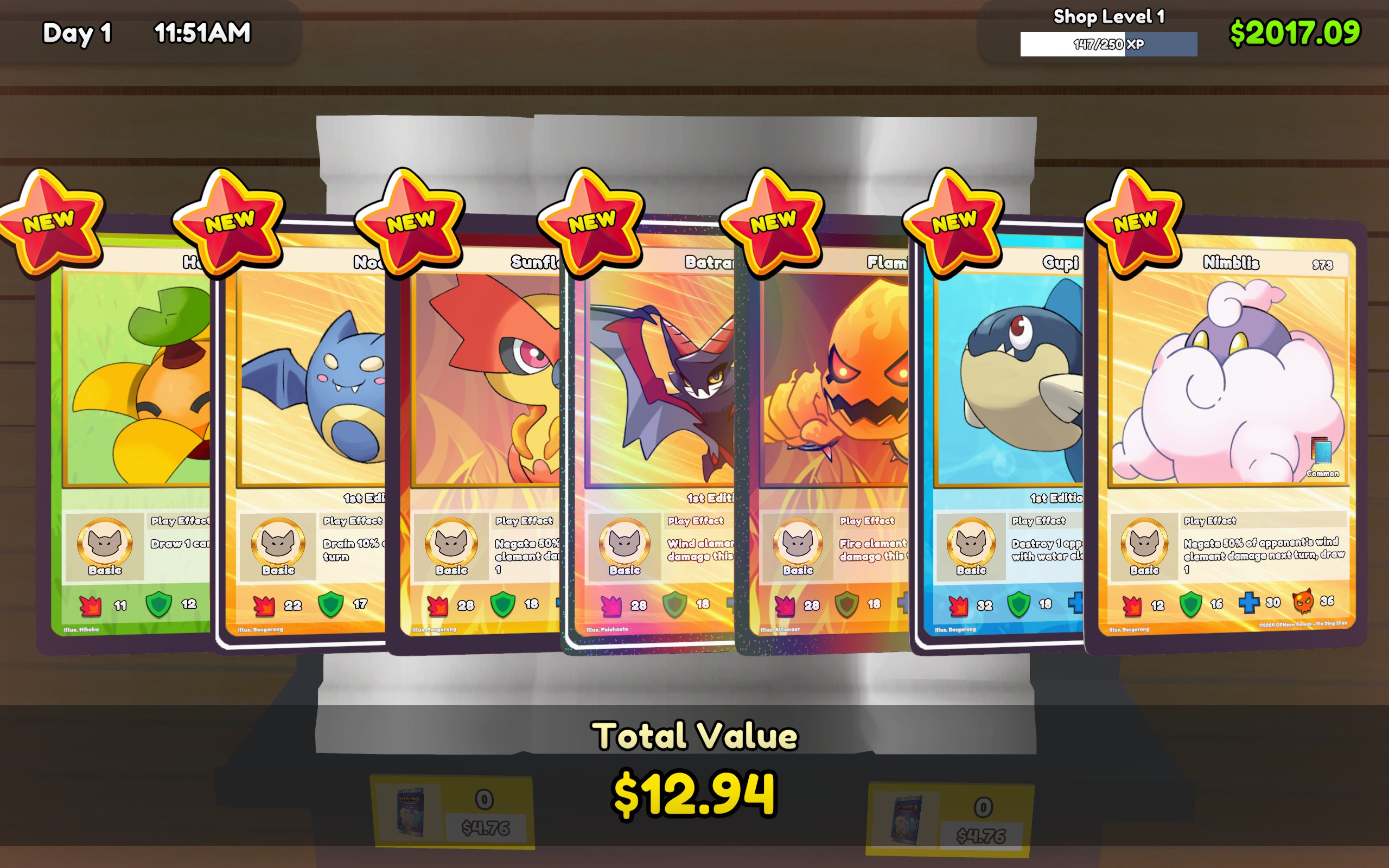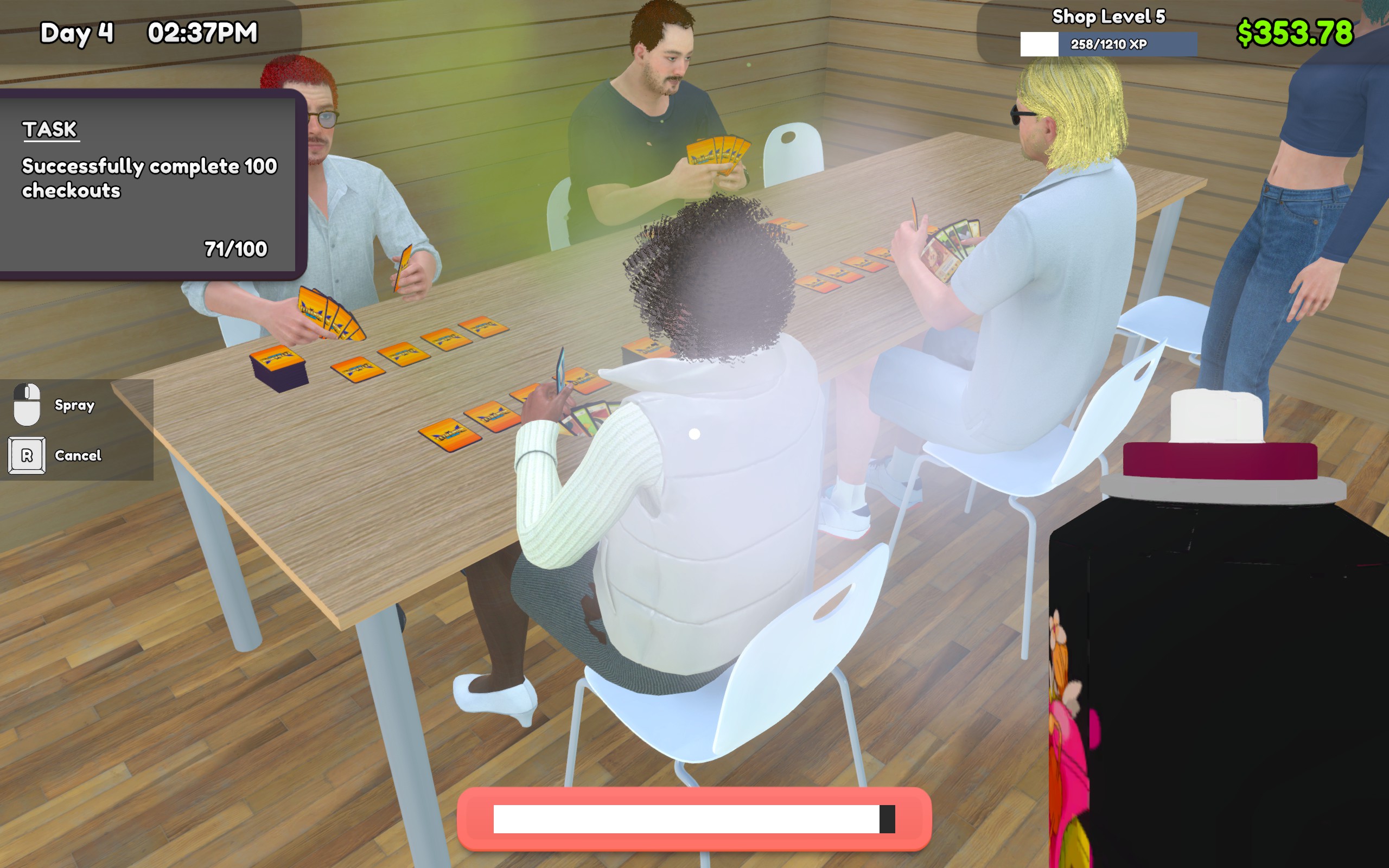Back in February, Supermarket Simulator came out in early access and laid down the format for this year's crop of budget indie streamer games. Turns out, if you take all the effort out of actually doing a mundane job it becomes a relaxing thing to watch someone else do, or to do yourself while listening to a podcast. The shop sims of 2024 make restocking shelves a cinch—you hold down a button and items fly out of boxes in perfect arcs—then transform working the till into a quick clickfrenzy of counting change and entering amounts for people who pay by card. They're simple brain-off fun.
But I used to work at a supermarket, so deleting the economic precarity from my years on Struggle Street rubs me the wrong way. I never worked at a game shop though, which is why I'm fine with turning that into a silly game. Watch your head, I need room to wave my double standard around in here.
TCG Card Shop Simulator is the shop sim players will inevitably bring up as the one that's good actually, despite it following the Supermarket Simulator template so closely you can practically hear the Ctrl-C and Ctrl-V keys being hammered. Where it deviates is that the boxes arriving instantly on your shop's doorstep aren't full of bread and pasta, but booster packs for "Tetramon: Duel Master" you can crack open yourself.
While popping them on the shelf is a more obvious way to make a paycheck, you can open them instead and then sell single cards at a markup. Those singles will be worth more than the pack they came from a generous amount of the time, but the real reason you want to open them is because it's more fun than working the till. The presentation of cracking a booster—as if you're sliding your thumb down the back and then flipping the cards one by one—is perfect. The cards themselves all look like derpy Pokémon you've never heard of and have names like Sunflork, Mufflin, and Wurmgle. Just say that last one out loud for the exquisite mouthfeel: Wurmgle.
The fact you're stocking shelves with cards and assorted nerd tat like figurines and dice rather than olive oil immediately makes it more engaging than Supermarket Simulator. The design of the Tetramon cards is spot on too, with the artist's names and rules text accompanying each picture of a big-eyed fish with an underbite or whatever. Here's why: they're all from a mobile game by the same developer called Tetramon Monster Battles TCG. The board games you can stock are real too, licensed from Speedrobo Games.
If that's not authentic enough for you, Nexus Mods has reskins that replace the Tetramon with actual Pokémon, Magic: The Gathering, or Yu-Gi-Oh cards, among other options.
The Card's Tale

This veneer of authenticity is definitely part of the appeal. Whether you're cracking a pack and shouting because you got a foil Crobib, or shelving a budget board game called Mafia Works, it does have the vibe of a real game shop. It also has the smell of one, because every now and then a customer enters surrounded by a green fog of stink. You can stop them from upsetting the other customers with a spray of cleanser, though you have to buy it like every other item and either yank a can off the shelf or out of a box each time you want to spray a stinker. (Later you can upgrade to automatic air-freshening machinery.)
While it was definitely true up until the 2010s at least that game shops, in the words of an ex-girlfriend I dragged into one, "reek of boy," things are different now. I can't remember the last time I went into a shop to look at the little plastic guys and encountered someone who smelled like cat piss. Maybe I've just been lucky.

The most significant difference between TCG Card Shop Simulator and an actual retail job is that nobody talks. People just hold out their cash—you can change which currency they use, so I defaulted to Australian dollars—in total silence, and it's a much nicer world than the one where customers want to actually engage with you.
As much as anything I think that's why the essentially mindless repetition of running a shop becomes fun in these games—freed of the social pressure of having to make small talk with people you may never see again it's just a repetitive activity that makes a number go up. That's videogames in their most basic form.
While I understand the appeal of TCG Card Shop Simulator, I can't love it, and not just because of the superfluous "Card" in its name. It's because I played Kardboard Kings: Card Shop Simulator back in 2022, which had all the basics of TCG Card Shop Simulator including the satisfying act of opening booster packs. The difference is that Kardboard Kings had a story instead of just an ever-increasing profit margin, and had returning customers with names and personalities rather than Unity store assets holding out their fistfuls of dollarydoos. Because it had an engaging personality of its own and a story with an ending, however, it wasn't ideal streamer bait, which TCG Card Shop Simulator absolutely is.












 Bengali (Bangladesh) ·
Bengali (Bangladesh) ·  English (United States) ·
English (United States) ·